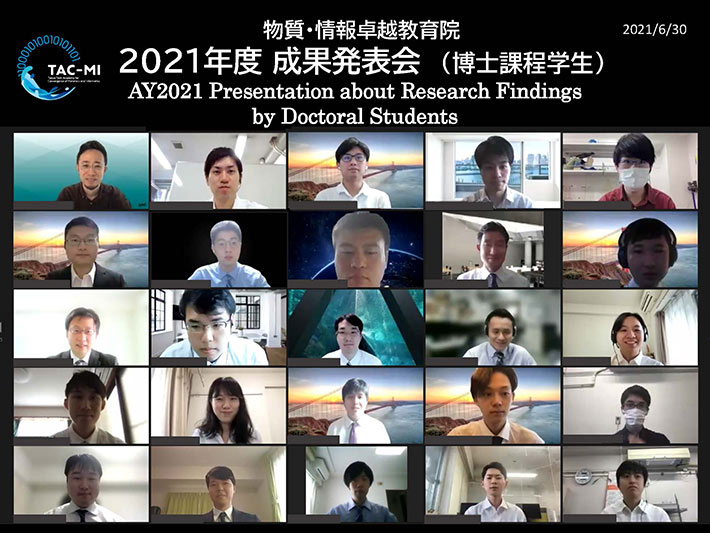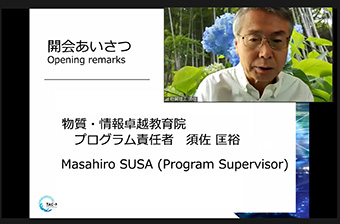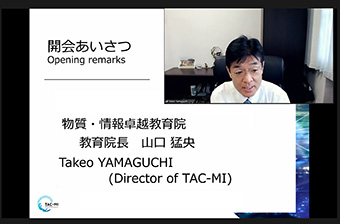Twenty-two doctoral students presented their latest research findings during an online session held by the Tokyo Tech Academy for Convergence of Materials and Informatics (TAC-MI) on June 30, 2021. Approximately 140 TAC-MI program staff members, students, and industrial collaborators tuned in to the presentations.

TAC-MI doctoral student presenters and session chairs
TAC-MI, established in January 2019 under the auspices of the Doctoral Program for World-leading Innovative & Smart Education (WISE) of the Ministry of Education, Culture, Sports, Science and Technology, aims to cultivate multi-talented individuals who can play leading roles in the creation of new industries and academic fields involving materials science, information science, and social services. The program also places strong emphasis on working closely with industry.
Program
| Part 1 |
Presentation of research findings by 1st-year doctoral students |
|---|---|
| Part 2 |
Presentation of Self-Designed Thesis progress by 2nd-year doctoral student |
| Part 3 |
TAC-MI students' interviews with industrial mentors |
| Part 4 |
Member company meetings |
| Part 5 |
Exchange meeting |
Part 1: Presentations of research findings by 1st-year doctoral students
In the first half of the event, 21 1st-year doctoral students gave presentations on the progress of their research and future prospects based on the fusion of materials and information. School of Materials and Chemical Technology Dean Masahiro Susa and TAC-MI Director Takeo Yamaguchi kicked things off with some opening words. During his remarks, Susa touched on the story of Eiichi Shibusawa, a serial entrepreneur who influenced many companies and contributed to social and public works projects, as well as private diplomacy, throughout his life. "I hope you broaden the scope of your research in the future and become innovators like Eiichi Shibusawa," Susa commented.
After the opening remarks, the presentations kicked off under the guidance of 2nd-year doctoral students who chaired the session. The six-minute presentations, followed by four-minute Q&A sessions, provided all students the opportunity to appeal to the audience regarding the findings of their research thus far. In particular, students were able to rethink how they can convey their research to people from different fields. Following each talk, the students received challenging but positive questions from the audience, making the most of this opportunity to present their research findings to an industry audience.

Opening remarks by Dean Susa

Opening remarks by Director Yamaguchi
Part 2: Presentation of Self-Designed Thesis progress by 2nd-year doctoral student
In the second part of the event, chaired by TAC-MI's Associate Professor Yu-ichiro Matsushita, one 2nd-year doctoral student gave a presentation on the progress of their TAC-MI Self-Designed Thesis.
For the Self-Designed Thesis, students choose a topic different from that of their dissertation and conduct research on their own initiative. They present these research findings upon completion of their doctoral degree program, and faculty members at TAC-MI review the presentations. Through this process, students acquire the ability to conduct unique research independently based on new ideas supported by knowledge of materials science and information science, transcending their individual specializations. TAC-MI students present their research progress in English at either the event in June or the International Forum in December during the second year of their doctoral program.
The rest of TAC-MI's 2nd-year doctoral students will give presentations at the International Forum, which will be held in December 2021.
TAC-MI students' interviews with industrial mentors
In the third part of the event, TAC-MI doctoral students conducted interviews with and received advice from their industrial mentors. TAC-MI students have the advantage of evaluating their strengths and weakness in face-to-face meetings with researchers, developers, technical experts, product planners, and marketing professionals from various industries. One industrial mentor is assigned to each student. Throughout the duration of this program, each student has an industrial mentor who continuously guides the student from enrollment to program completion.
This was the fourth interview session with corporate mentors since the TAC-MI program began. Forty-four doctoral students participated. This was the final interview for 3rd-year doctoral students, who had also conducted interviews in 2020 and 2019. Many mentors commented that their mentees had clearly experienced growth in the past three years. The advice received from mentors through interviews can be very helpful for students in terms of research, presentation skills, and career development.
After the event, TAC-MI program staff members and industrial collaborators who listened to the presentations provided feedback to the presenters. Opinions and comments included the following.
- Many students are conducting research with an awareness of social implementation and SDGs. I felt that this event was a great success.
- Within the limited presentation time, I think that the students devised and presented their research contents so that they could be easily understood by non-specialists. Many students are conscious of the originality of their own research, and I was impressed with the significant improvement compared to previous years.
- TAC-MI students are well trained in a very privileged environment. Students can participate in two-week laboratory rotations in which those who specialize in materials science will study at an information science laboratory, while students who specialize in information science will study at a materials science laboratory. I felt that the quality of presentations was high among the 1st-year doctoral students. I was also impressed with the smooth management conducted by the 2nd-year doctoral students.
At the end of the event, an exchange meeting was held to deepen communication between TAC-MI students and industrial collaborators. The exchange meeting was divided into five breakout session rooms. The opportunity to receive advice from industrial collaborators through interviews, exchange meetings, and feedback sheets after presentations was a valuable experience for students.
Through exchange events with corporate partners, TAC-MI continues to cultivate multi-talented individuals required by industry who apply a broad, global perspective to understanding new social services and innovating new ideas.
What is TAC-MI?
TAC-MI, established in January 2019 under the auspices of the Doctoral Program for World-leading Innovative & Smart Education (WISE) of the Ministry of Education, Culture, Sports, Science and Technology, aims to cultivate multi-talented individuals who can play a leading role in creating new industry and academic field involving materials science, information science, and social services. The program also places strong emphasis on working closely with industry.






